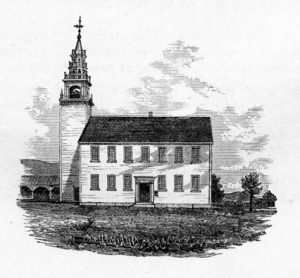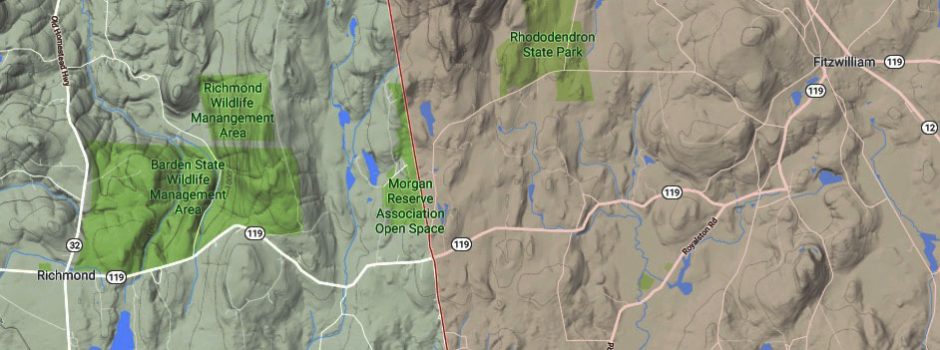If you wish, you can hear this sermon as it was preached in the pulpit of the United Church of Jaffrey. Simply click to the play button below.
Delivered to the United Church of Jaffrey
Jaffrey New Hampshire
April 15th, 2018
Luke 24:36-48 | An Excerpt from “A Letter from Birmingham Jail” by Martin Luther King Jr.
I am in Birmingham because injustice is here. Just as the prophets of the eighth century B.C. left their villages and carried their “thus saith the Lord” far beyond the boundaries of their home towns, and just as the Apostle Paul left his village of Tarsus and carried the gospel of Jesus Christ to the far corners of the Greco Roman world, so am I compelled to carry the gospel of freedom beyond my own home town. Like Paul, I must constantly respond to the Macedonian call for aid.
Moreover, I am cognizant of the interrelatedness of all communities and states. I cannot sit idly by in Atlanta and not be concerned about what happens in Birmingham. Injustice anywhere is a threat to justice everywhere. We are caught in an inescapable network of mutuality, tied in a single garment of destiny. Whatever affects one directly, affects all indirectly.
April Flurries
Heading home on Rte 119 last Tuesday, somewhere between Fitzwilliam and Richmond I drove into some April flurries — one of the last, whispered complaints of a winter that outstayed its welcome.But I was hard pressed to stay annoyed for long because the snowflakes were so ridiculously large!
They looked like feathers.
For a moment it seemed less like being on the road in the snow, than like being at a sleepover in the aftermath of a pillow fight gone awry.
Each enormous flake floated so lazily that, if I tried, I could actually follow the path of an individual flake as it glided through the air before relinquishing it’s momentary form beneath the steady beat of my windshield wipers…
Suddenly the snow changed from being a weather front moving across the ridgeline, to millions and millions of individual crystals…
But as arresting and lovely a moment as this was, it had within it an element of danger —
Its hazardous to be mesmerized by detail when you are driving.
When you are trying to get somewhere — that goal — the goal of arriving at your destination safely, is more important than getting lost in a beautiful reverie…
Our lives insist that we see things in aggregate…
Imagine trying to count snowflakes!
Imagine counting each tree limb.
Every lamp post
Every face in a crowd
Every passing automobile,
Every cloud in the sky…
Help!
See, Look, Witness
Unless you have a visual impairment… you see things.
When you open your eyes in the morning, the first thing you do is see something. And from that moment on you just keep it up, for the rest of the day, moving around, seeing this and seeing that.
But you can’t pay attention to everything.
You’d lose your mind!
If you want to keep your mind, you have to choose…
You have to not pay attention to lots of things, so that you can pay attention to certain things…
Or maybe it would be helpful to put it this way:
Everyday we see untold millions of things, but we only really look at a small percentage of the things we see.
When we look at something, we pay attention to it, if only for a moment.
And there is yet another level to this business of seeing and looking, that we will consider this morning.
And that is to witness.
What does it mean to witness something?
I suggest that witnessing is on a different order, again, from seeing or looking.
We may look at — that is, pay attention to, a handful of things each day.
But I think, we witness a handful of things each lifetime.
When we witness something, we are not choosing to look at it — rather it is choosing us, to be responsibleto it.
What do I mean?
Let’s look, for a moment, at this morning’s Gospel reading from the Book of Luke.
A Spiritual Conspiracy
Jesus — who has appeared before all of his disciples for the first time since his resurrection — takes some pains to reassure them them that he is not a ghost, and then tells them:
“Thus it is written, that the Messiah is to suffer and to rise from the dead on the third day, and that repentance and forgiveness of sins is to be proclaimed in his name to all nations, beginning from Jerusalem.
And, in case they did not fully appreciate the full significance of the moment, he adds:
You are witnesses of these things.
I doubt, however, that Jesus had to remind them of this.
I suspect they already knew.
Because there is something, isn’t there — something that makes the hair stand up on the back of our necks…
Something that widens our eyes
And makes us stand up straight
When we become aware of something of extraordinary significance.
And this moment, clearly, was one of those moments.
Each disciple knew, in their gut, that what they saw before them was something that had never happened before — that when their beloved spiritual teacher returned to them, he was returning to change the order of things forever.
The relationship between life and death had been altered.
And they — the people in that room — were responsible to that new thing.
It was up to them to insure that this moment — this discovery, in human form, that love out-manuevers death — would not be forgotten, and that thousands of years hence, people would continue to gather in buildings of wood or stone, on mountains and in valleys, to proclaim the beauty of this truth…
Its amazing and humbling to think of what a very fragile thread of witness it is that connects us, gathered here, this morning, in our humble church in the shadow of Monadnock, to that fleeting moment in Jerusalem when the Jesus returned and said “Peace be with you.”
And yet, perhaps, there is a kind of eternity in that moment that makes it shimmer with significance.
A kind of spiritual conspiracy between the mystery that surrounds us, and the beating of our hearts.
We do not have any difficulty at all recognizing such moments — our souls are attuned to feel their effect, like the needle of a seismograph registering a distant tremor in the earth.
Martyr
And, hidden in this text, is a clue that helps us to understand why this idea of witness carries with it such profound significance…
Anytime I get to the point in a sermon, as I have now — in which a single word or idea has simply monopolized all of my attention, I invariably decide — “OK, I have to look this up, and see if the Greek tells me anything.”
There is a handy little tool, which is now on the internet (of course) called the “Interlinear Greek Bible” which prints the original Greek text above an English translation.
So I went to Google and typed “Interlinear Greek Bible Luke 24:48” and guess what I found?
Another surprise!
The English text reads: You are witnesses of these things.
And above the word witnesses is the Greek word martyres.
Martyres.
As in “Martyr”
This confused me more than a little bit.
I have never had any notion that the word “martyr” has anything to do with “witness.”
But, according to Strong’s Greek Lexicon (also now available oin the Web) the Greek root “Martus” means one who is mindful, heeds; a witness…
I know the word “martyr” to be associated with people like Peter and Paul, for example, who died rather then recant their faith.
This certainly changes the parameters of our understanding of the idea of witness.
Distant Cannonading
But when you think about it, it kind of makes sense.
The idea of witness does seem to come into play in connection with matters of life and death.
When the disciples were called by Jesus to witness the truth of his resurrection, they were, to be sure, concerned, at that moment, with matters of life and death.
And if you consider our contemporary legal system — that other discipline where we often use the word “witness” — here too, the notion is related to matters of life and death.
In a murder trial, for example, a witness, finds him or herself at a critical juncture between life and death. The witness who has seen someone kill someone else, is held to a daunting responsibility — to save or help take the life from the accused.
When, as in the wedding ceremony that I was a part of yesterday, the community is called to witness the loving bond between two people, we encourage the lovers to remain together “till death do us part.”
Moments of profound historical and social change — when our way of life is forever altered — are also moments of witness — as when Martin Luther King Jr. Spoke of his dream on the steps of the Lincoln memorial.
A lovely moment of witness is recorded in volume four of the history of Jaffrey New Hampshire.  The relevant excerpt reads as follows:
The relevant excerpt reads as follows:
On the common in Jaffrey Center, the Meeting House ridgepole was raised on Saturday, the seventeenth of June 1775 — that hot, sultry day of the Battle of Bunker Hill. The distant cannonading echoed up to the men on the rooftree causing great wonderment and discussion. Not until the next day did they learn of the momentous event off to the east that had been coincident with the birth of the Town’s Meeting House.
And this, dear Brothers and Sisters in Christ, brings us to our inevitable conclusion — that witness is not merely vision — but vision with responsibility attached.
It can happen to any of us at any time.
And we can choose to ignore our responsibility.
Or we can hear the distant reverberations of of the canons of freedom, and take part in something greater than ourselves.
Amen.


